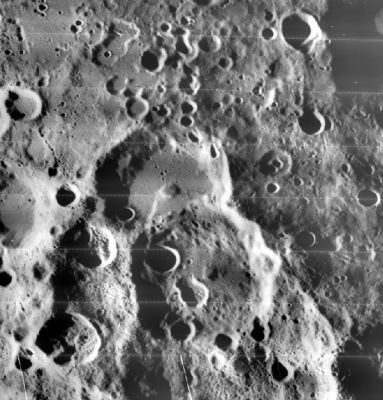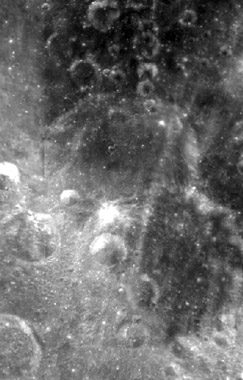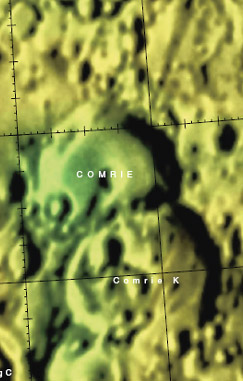Difference between revisions of "Comrie"
| Line 15: | Line 15: | ||
==Images== | ==Images== | ||
[http://www.lpod.org/coppermine/thumbnails.php?album=search&type=full&search=Comrie LPOD Photo Gallery] [http://www.lpi.usra.edu/resources/lunar_orbiter/bin/srch_nam.shtml?Comrie%7C0 Lunar Orbiter Images]<br /> | [http://www.lpod.org/coppermine/thumbnails.php?album=search&type=full&search=Comrie LPOD Photo Gallery] [http://www.lpi.usra.edu/resources/lunar_orbiter/bin/srch_nam.shtml?Comrie%7C0 Lunar Orbiter Images]<br /> | ||
| − | * Note: The identification and location of '''Comrie''' in the linked Lunar Orbiter Images (V-014-M, V-015-H2) above are incorrect -- they, in fact, point to '''Comrie K'''. <span class="membersnap">- | + | * Note: The identification and location of '''Comrie''' in the linked Lunar Orbiter Images (V-014-M, V-015-H2) above are incorrect -- they, in fact, point to '''Comrie K'''. <span class="membersnap">- JohnMoore2</span> |
==Maps== | ==Maps== | ||
''([[LAC%20zone|LAC zone]] 53C2)'' [http://planetarynames.wr.usgs.gov/images/Lunar/lac_53.pdf USGS Digital Atlas PDF]<br /> <br /> | ''([[LAC%20zone|LAC zone]] 53C2)'' [http://planetarynames.wr.usgs.gov/images/Lunar/lac_53.pdf USGS Digital Atlas PDF]<br /> <br /> | ||
==Description== | ==Description== | ||
| − | From the [http://the-moon.us/wiki/Ohm Ohm] ray which crosses the easterly sector of '''Comrie''' as seen in the Clementine image above (middle), one immediately surmises that the crater must be older than [[Stratigraphy|Copernican]] (~ 1.1 bn years to present) in age. However, on closer examination of '''Comrie's''' overall appearance, one could go further to suggest that it may be older; as most of its northern, eastern and western sectors show a worn-looking appearance like one sees in a crater of the [[Stratigraphy|Eratosthenian]] (3.15 to 1.1 bn years old) or [[Stratigraphy|Imbrium]] (3.85 to 3.15 bn years old) period. Time has allowed for several dynamic events to take place; that of slumping, terracing, and smaller impacts around and within the crater, but most especially of note the total obliteration of any subsequent event-history that occurred in the crater's south-eastern sector by '''Comrie K''' (73 km in diameter). '''Comrie's''' floor is relatively flat except for a small hill or once-existant peak that may have been covered over by a clump of material from the '''Comrie K''' impact event to its south-east (note the ridge-highlight that starts at the peak's western sector and also the slightly shaded ridge to its east -- both connecting to '''Comrie's K's''' north-western sector). <span class="membersnap">- | + | From the [http://the-moon.us/wiki/Ohm Ohm] ray which crosses the easterly sector of '''Comrie''' as seen in the Clementine image above (middle), one immediately surmises that the crater must be older than [[Stratigraphy|Copernican]] (~ 1.1 bn years to present) in age. However, on closer examination of '''Comrie's''' overall appearance, one could go further to suggest that it may be older; as most of its northern, eastern and western sectors show a worn-looking appearance like one sees in a crater of the [[Stratigraphy|Eratosthenian]] (3.15 to 1.1 bn years old) or [[Stratigraphy|Imbrium]] (3.85 to 3.15 bn years old) period. Time has allowed for several dynamic events to take place; that of slumping, terracing, and smaller impacts around and within the crater, but most especially of note the total obliteration of any subsequent event-history that occurred in the crater's south-eastern sector by '''Comrie K''' (73 km in diameter). '''Comrie's''' floor is relatively flat except for a small hill or once-existant peak that may have been covered over by a clump of material from the '''Comrie K''' impact event to its south-east (note the ridge-highlight that starts at the peak's western sector and also the slightly shaded ridge to its east -- both connecting to '''Comrie's K's''' north-western sector). <span class="membersnap">- JohnMoore2</span><br /> <br /> |
==Description: Wikipedia== | ==Description: Wikipedia== | ||
[http://en.wikipedia.org/wiki/Comrie_(crater) Comrie]<br /> <br /> | [http://en.wikipedia.org/wiki/Comrie_(crater) Comrie]<br /> <br /> | ||
Latest revision as of 21:08, 16 April 2018
Contents
Comrie
| Lat: 23.3°N, Long: 112.7°W, Diam: 59 km, Depth: km, Rükl: (farside) | ||
Images
LPOD Photo Gallery Lunar Orbiter Images
- Note: The identification and location of Comrie in the linked Lunar Orbiter Images (V-014-M, V-015-H2) above are incorrect -- they, in fact, point to Comrie K. - JohnMoore2
Maps
(LAC zone 53C2) USGS Digital Atlas PDF
Description
From the Ohm ray which crosses the easterly sector of Comrie as seen in the Clementine image above (middle), one immediately surmises that the crater must be older than Copernican (~ 1.1 bn years to present) in age. However, on closer examination of Comrie's overall appearance, one could go further to suggest that it may be older; as most of its northern, eastern and western sectors show a worn-looking appearance like one sees in a crater of the Eratosthenian (3.15 to 1.1 bn years old) or Imbrium (3.85 to 3.15 bn years old) period. Time has allowed for several dynamic events to take place; that of slumping, terracing, and smaller impacts around and within the crater, but most especially of note the total obliteration of any subsequent event-history that occurred in the crater's south-eastern sector by Comrie K (73 km in diameter). Comrie's floor is relatively flat except for a small hill or once-existant peak that may have been covered over by a clump of material from the Comrie K impact event to its south-east (note the ridge-highlight that starts at the peak's western sector and also the slightly shaded ridge to its east -- both connecting to Comrie's K's north-western sector). - JohnMoore2
Description: Wikipedia
Additional Information
Nomenclature
Leslie John; British astronomer (1893-1950).
LROC Articles
A Scar in the Highlands (west of Comrie).
Bibliography


